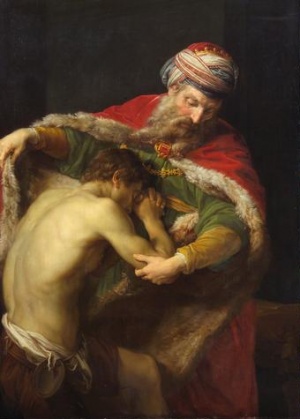The Prodigal Son
|
"He arose, and came to his father. But while he was still far off, his father saw him, and was moved with compassion, and ran, and fell on his neck, and kissed him. Luke 15:20
|
| The Lost Son | |
| RELATED TOPICS |
|
| SERMONS, ESSAYS AND OPINIONS |
|
| CONTENTS | |
Commentary
The Parable of the Prodigal Son is one of the most well known of the parables told by Jesus. The story is found in Luke 15:11–32. being preceded by The Lost Sheep and The Lost Coin. Jesus tells the story of a son who dishonours his father and squanders his fortues and returns home in disgrace to his father but is welcomed with arms open wide and forgiveness.
Text - Luke 15:11-32
Interpretations
Although the story is traditionally referred to as "The Prodigal Son", this title is not found in the gospel, and some feel that it would be better called "The Lost Son", showing its parallels to the parables of the "Lost Sheep" and "Lost Coin" which immediately precede it in Luke 15. In all three, the theme is the concern of God for the repenting sinner. Indeed, many people with no other acquaintance with the word "prodigal" mistakenly believe it means lost. It actually means extravagant. Others feel that the parable might be better called the story of "The Two Sons", to emphasise the role of the elder son, and the lesson against envy and low-mindedness that it contains.
The story is one of several very well-known parables of Jesus that are only found in Luke's gospel. It expresses of the inclusive love and grace of God. The forgiveness of the son is not conditional on good works, since he has plainly done nothing "good" throughout the story, other than to return home, symbolic of repentance; and although he formulates the intention of admitting his guilt to his father, his father accepts him even before he gets the chance to carry his intention out, although he indeed makes his prepared speech of confession in the end. This shows that repentance implies a change in the direction of one's life - which the Prodigal Son literally demonstrates.
The Eastern Orthodox Church traditionally reads this story on the Sunday of the Prodigal Son, which in their liturgical year is the Sunday before Meatfare Sunday and about two weeks before the beginning of Great Lent. One common kontakion hymn of the occasion reads,
- I have recklessly forgotten Your glory, O Father
- And among sinners I have scattered the riches which You gave to me
- And now I cry to You as the Prodigal
- I have sinned before You, O merciful Father
- Receive me as a penitent and make me as one of Your hired servants
The rebuttal to the Pharisees
Within the context of Luke 15, these three parables — the Lost Sheep, the Lost Coin, and the Lost Son — make up a rebuttal to the Pharisees' accusation to Jesus: "This man welcomes sinners and eats with them." They may have been referring obliquely to Psalm 1:1:
- Blessed is the man who does not walk in the counsel of the wicked or stand in the way of sinners or sit in the seat of mockers.
In these parables Jesus illustrates that "sinners" are people in peril, and so it would be only natural that He spend time with them. Thus He not only rebuffs the Pharisee's accusations, but justifies His own actions as correct and natural.
Quotes
Links
Return to Christianity -> Jesus -> Parables of Jesus
Note to users: The wiki is currently operating in safe mode. Editing is limited to users with certain privileges in order to deal with spam. You can create a new user account, and confirm your email ID in order to obtain ability to edit pages. Learn how to be an editor or sysop at WikiChristian.
- Sister projects: WikiMD.com Wellness Encyclopedia & Directory
- Sponsors: WikiChristian is supported by W8MD's medical weight loss and sleep centers.

